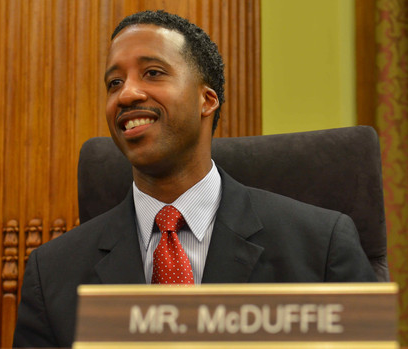The Washington, D.C. Council unanimously approved a first vote of the Comprehensive Youth Adjustment Act of 2016 on Oct. 11, which would institute reforms to D.C.’s criminal justice system for juveniles in detention centers, most of which focus on separating how the criminal justice system treats juvenile and adult criminal offenders.
Councilmembers Kenyan McDuffie (D-Ward 5), David Grosso (I-At large), Brianne Nadeau (D-Ward 1), Anita Bonds (D-At Large), LaRuby May (D-Ward 8), Elissa Silverman (I-At Large) and D.C. Council Chairman Phil Mendelson (D) originally introduced the bill in April. The purpose of the legislation is to prohibit jailing juveniles before a hearing, limit solitary confinement, exempt juveniles who commit minor offenses from imprisonment and avoid placing offenders under the age of 18 into adult prisons.
The District’s bill, which has garnered the support of 28 local and national advocacy organizations, reflects President Barack Obama’s executive order to ban solitary confinement for juveniles in federal prisons.
Having passed the D.C. Council’s first vote, the bill will be up for second vote before it is officially passed.
McDuffie stressed the detrimental effect of the criminal justice system on juveniles as a reason for introducing this legislation. According to McDuffie, after being convicted of a crime as a juvenile, past offenders struggle to successfully reintegrate into society and often commit crimes again.
“We know that, when a young man or woman comes into contact with the justice system, it is often a pivotal moment in their lives,” McDuffie wrote in a press release. “What happens next often sets the trajectory for the rest of their lives — and ultimately determines whether they will eventually be contributing members of our community.”
According to the Department of Youth Services, 10 percent of newly incarcerated youth in the fiscal year 2015 were still in jail. Of those who were released, nearly 30 percent were placed under home arrest and about another 30 percent went to residential treatment facilities.
The bill, which will cost around $6.7 million to implement over the span of the next four years, aims to improve the conditions of confinement, invest in data collection and protect at-risk minors in the District community. McDuffie’s spokesman, Nolan Treadway, said the councilmember hopes the bill will combat recidivism, which is a relapse into criminal behavior following incarceration.
“Hopefully, we’re seeing more reasonable treatment of juveniles that are in the system and also not so much focus on punishment and retribution but on rehabilitation, not recidivism,” Treadway said in an interview with The Hoya.
A large focus of the bill is separating how juvenile and adult offenders are treated by the criminal justice system. Paul Rothstein, a professor of law on civil procedure and trial practice at the Georgetown University Law Center, said more money should be spent on special facilities, counseling and court procedures for juveniles.
“There is too much of a punitive attitude toward children as though they are on par with adult offenders. I think that the more humanely you treat juveniles, the better chances you have at rehabilitating them and preventing them from seeking further into a life of crime,” Rothstein said. “These provisions will move the District of Columbia even further forward on the front of improving a lot of juvenile facilities.”
Government and law department professor Marc Howard is also the director of the Georgetown Prison and Justice Initiative, which was founded last year to examine mass incarceration in the United States from a variety of viewpoints. Howard said the American penal system remains plagued by issues of mandatory minimums, parole procedures, re-entry into society after prison and public assistance.
“I got involved about a decade ago when my friend had been wrongfully convicted of double murder. The further involved I got, the more I realized that his case, as crazy as it was, wasn’t that exceptional,” Howard said. “It’s been a long journey to the underbelly of the American criminal justice system and realizing that much of it is deeply flawed and in desperate need of reform.”
Julia Kerbs (COL ’17), president of the Georgetown initiative Prison Outreach, which teaches classes and is involved with one-on-one tutoring with inmates at the Alexandria and Arlington detention facilities, said the organization may be involved with assisting recovering juveniles in the future.
“I’m really excited to see that there’s more of a humanizing effort,” Kerbs said. “These people are kids, the people you babysit, the people you tutor. These are the people that you live across the street from.”
Kerbs noted that the bill’s focus on rehabilitation rather than punishment was a good first step.
“When rehabilitation is emphasized, the recidivism rate’s lower. We see more productive relations within communities for returning citizens and we see a lower likelihood of violent crime and drug crime,” Kerbs said. “I think it’s absolutely crucial for people behind bars, for their families and for every American.”

The D.C. Council has unanimously approved a first reading of a bill to reform the criminal justice system for juvenile offenders.




















